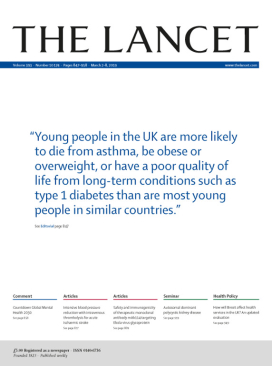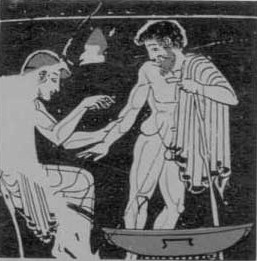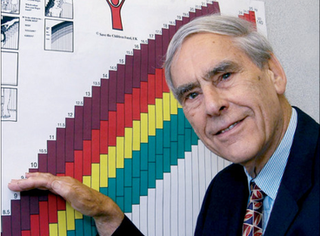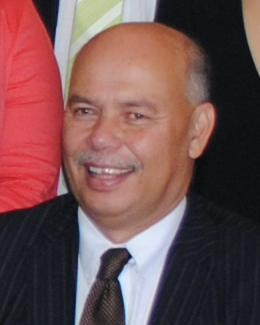Related Research Articles

The Lancet is a weekly peer-reviewed general medical journal and one of the oldest of its kind. It is also the world's highest-impact academic journal. It was founded in England in 1823.

Global health is the health of the populations in the worldwide context; it has been defined as "the area of study, research, and practice that places a priority on improving health and achieving equity in health for all people worldwide". Problems that transcend national borders or have a global political and economic impact are often emphasized. Thus, global health is about worldwide health improvement, reduction of disparities, and protection against global threats that disregard national borders, including the most common causes of human death and years of life lost from a global perspective.
Viral pneumonia is a pneumonia caused by a virus. Pneumonia is an infection that causes inflammation in one or both of the lungs. The pulmonary alveoli fill with fluid or pus making it difficult to breathe. Pneumonia can be caused by bacteria, viruses, fungi or parasites. Viruses are the most common cause of pneumonia in children, while in adults bacteria are a more common cause.

Alan Julian Macbeth Tudor-Hart, commonly known as Julian Tudor Hart, was a general practitioner (GP) who worked in Wales for 30 years, known for theorising the inverse care law. He produced medical research and wrote many books and medical articles.

Sir Michael Gideon Marmot is Professor of Epidemiology and Public Health at University College London. He is currently the Director of The UCL Institute of Health Equity. Marmot has led research groups on health inequalities for over thirty years, working for various international and governmental bodies. In 2023, he was elected to the American Philosophical Society.

The field of social medicine seeks to implement social care through
- understanding how social and economic conditions impact health, disease and the practice of medicine and
- fostering conditions in which this understanding can lead to a healthier society.

Iatrogenesis is the causation of a disease, a harmful complication, or other ill effect by any medical activity, including diagnosis, intervention, error, or negligence. First used in this sense in 1924, the term was introduced to sociology in 1976 by Ivan Illich, alleging that industrialized societies impair quality of life by overmedicalizing life. Iatrogenesis may thus include mental suffering via medical beliefs or a practitioner's statements. Some iatrogenic events are obvious, like amputation of the wrong limb, whereas others, like drug interactions, can evade recognition. In a 2013 estimate, about 20 million negative effects from treatment had occurred globally. In 2013, an estimated 142,000 persons died from adverse effects of medical treatment, up from an estimated 94,000 in 1990.

Sir Andrew Paul Haines, FMedSci is a British epidemiologist and academic. He was the Director of the London School of Hygiene & Tropical Medicine from 2001 to 2010.

David Cornelius Morley was a British paediatrician and Emeritus Professor of Child Health, UCL Institute of Child Health who saved the lives of many thousands of children in developing countries.

Zhu Jiming, better known in English as Chi-Ming Chu, was a Chinese virologist. He was a member of the Chinese Academy of Science and an Honorary Member of the American Society for Microbiology.

Jocalyn Clark is a Canadian Public Health Scientist and the International Editor of The BMJ, with responsibility for strategy and internationalising the journal's content, contributors and coverage. From 2016 to 2022, Jocalyn was an Executive Editor at The Lancet, where she led the Commentary section, coordinated peer review, and edited and delivered collections of articles and Commissions on topics such as maternal and child health, oral health, migration, end of life care and gender equity. She led the Lancet's project to advance women in science, medicine, and global health, #LancetWomen. She is also an Adjunct Professor of Medicine at the University of Toronto and an Honorary Associate Professor at the Institute for Global Health at UCL.

Child development in India is the Indian experience of biological, psychological, and emotional changes which children experience as they grow into adults. Child development has a significant influence on personal health and, at a national level, the health of people in India.
Mathuram Santosham is an Indian American physician who is Professor and Chair at the Johns Hopkins Bloomberg School of Public Health. Santosham is best known for his work on oral rehydration therapy and childhood vaccines, with a focus on supporting people from indigenous communities.

The Vaccine Confidence Project (VCP) founded in 2010 by Heidi Larson, was developed in response to hesitancy and misinformation on vaccination programmes such as those that caused a boycott of polio eradication efforts in Northern Nigeria in 2003–04. It is an early warning system to identify and evaluate public confidence in vaccines, with the purpose of tackling the problem early, when it is likely to be manageable.
Madhukar Pai is a medical doctor, academic, advocate, writer, and university professor. Pai's work is around global health, specifically advocacy for better treatment for tuberculosis with a focus on South Africa and India. Pai is the Canada Research Chair of Epidemiology and Global Health at McGill University.

The International Medical Congress was a series of international scientific conferences on medicine that took place, periodically, from 1867 until 1913.

Sir Collin Fonotau Tukuitonga is a Niuean-born New Zealand doctor, public health academic, public policy expert and advocate for reducing health inequalities of Māori and Pasifika people. He has held several positions in public health and government in New Zealand and internationally.

As of May 2023, COVID-19 is a pandemic, but could become endemic in a future phase. The observed behavior of SARS-CoV-2, the virus that causes COVID-19, suggests it is unlikely it will die out, and the lack of a COVID-19 vaccine that provides long-lasting immunity against infection means it cannot immediately be eradicated; thus, a future transition to an endemic phase appears probable. In an endemic phase, people would continue to become infected and ill, but in relatively stable numbers. Precisely what would constitute an endemic phase is contested.

Felicia Marie Knaul is a British–Canadian health economist who is director of the University of Miami Institute for Advanced Study of the Americas and a professor at the Leonard M. Miller School of Medicine. She is an economist with the Mexican Health Foundation and president of the non-governmental organization Tómatelo a Pecho, an advocacy organisation that promote women's health in Latin America. Her research and leadership has focused around raising awareness of breast cancer in low and middle income countries.
References
- ↑ Van De Pas, Remco; Widdowson, Marc-Alain; Ravinetto, Raffaella; N Srinivas, Prashanth; Ochoa, Theresa J.; Fofana, Thierno Oumar; Van Damme, Wim (2 January 2022). "COVID-19 vaccine equity: a health systems and policy perspective". Expert Review of Vaccines. 21 (1): 25–36. doi:10.1080/14760584.2022.2004125. ISSN 1476-0584. PMC 8631691 . PMID 34758678.
- 1 2 Saul, Peter (27 February 2021). "How much has really changed 50 years on from seminal article on health inequality?". Nation.Cymru. Retrieved 6 April 2022.
- ↑ The Lancet (27 February 2021). "50 years of the inverse care law". The Lancet. 397 (10276): 767. doi: 10.1016/S0140-6736(21)00505-5 . ISSN 0140-6736. PMID 33640043.
- ↑ Tudor Hart, J. (1971). "The Inverse Care Law". The Lancet. 297 (7696): 405–412. doi: 10.1016/S0140-6736(71)92410-X . PMID 4100731.
- ↑ Watt, Graham (December 2018). "The inverse care law revisited: a continuing blot on the record of the National Health Service". The British Journal of General Practice. 68 (677): 562–563. doi:10.3399/bjgp18X699893. ISSN 0960-1643. PMC 6255247 . PMID 30498141.
- ↑ "GOVT TAKES ACTION TO REDUCE HEALTH INEQUALITIES". Local Government Chronicle. 12 August 1997. Retrieved 21 December 2013.